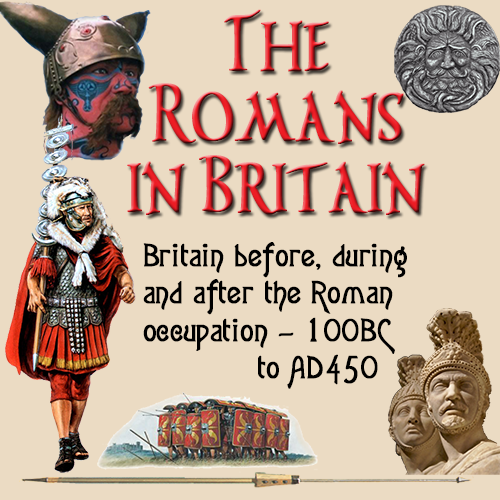Tiberius Claudius Nero Germanicus
(10 BC - 54 AD)
Titles: Tiberius Claudius Caesar Augustus Germanicus, Pontifex Maximus, Consul V, Imperator XXVII, Tribuniciae Potestatis XIV, Pater Patriae
|
Wives:
|
Plautia Urgulanilla
|
Aelia Paetina (28AD)
|
Valeria Messalina (38AD)
|
Julia Agrippina (49AD
|
|
Children:
|
Claudius Drusus - Daughter
Claudia - Daughter |
Antonia - Daughter
|
Octavia - Daughter
Britannicus - Son |
 Tiberius Claudius Nero Germanicus was born Lugunum in 10 BC, the youngest son of Nero Drusus, brother of Tiberius. He was a strange child and prone to constant illness, not only of the body, but also the mind. Generally it is believed that he was somewhat retarded and suffered from bouts of irrational behaviour and depression. He also had physical ailments that included a severe stutter and a stoop He had a nervous tic that caused many at meetings he chaired to find it hard to contain their laughter at his antics. He was known to be a heavy drinker, often spending several days incapable and incoherent. Even so, he was tall and well built which gave him a commanding presence to those around him.
Tiberius Claudius Nero Germanicus was born Lugunum in 10 BC, the youngest son of Nero Drusus, brother of Tiberius. He was a strange child and prone to constant illness, not only of the body, but also the mind. Generally it is believed that he was somewhat retarded and suffered from bouts of irrational behaviour and depression. He also had physical ailments that included a severe stutter and a stoop He had a nervous tic that caused many at meetings he chaired to find it hard to contain their laughter at his antics. He was known to be a heavy drinker, often spending several days incapable and incoherent. Even so, he was tall and well built which gave him a commanding presence to those around him.
A Family "Reject"
He was something of a reject in the family but as he had been born into a family of influence, it was undecided what to do with him. Under Tiberius, he did not hold any official post, and he was only awarded the public distinction of augurate. The only appointment he gained was a consulship given to him by his nephew Gaius (popularly called "Caligila"), when he became emperor.
A Strange Beginning
C laudius succeded to the throne when Gaius was assasinated on January 24, 41AD. On witnessing the murder, Claudius believed that he was next to die, and so he ran to the palace and hid behind curtains in one of the apartments. When he was discovered by a guardsman, he pleaded for his life, promising anything if they spared him. The soldiers thought this was hilarious, as they had not come to kill him, but to proclaim him the new emperor.
laudius succeded to the throne when Gaius was assasinated on January 24, 41AD. On witnessing the murder, Claudius believed that he was next to die, and so he ran to the palace and hid behind curtains in one of the apartments. When he was discovered by a guardsman, he pleaded for his life, promising anything if they spared him. The soldiers thought this was hilarious, as they had not come to kill him, but to proclaim him the new emperor.
The fact that Claudius had the throne did not please the Senate, and the Senators discussed their possible options, as having a dimwit controlling the Roman Empire was not the best idea if the empire was to flourish. The praetorian guard was a powerful institution and easily wielded influence over the government. There was always the fear that anyone who stood against a strong institution would soon find themselves in an early grave. To appease the praetorians, the senate granted Claudius all the imperial powers.
A Consummate Politician
Claudius may not have been the brightest of emperors, but even he knew how to buy the favour of those in authority. He granted the praetorian guard a large gift after he was made emperor, thus ensuring their continued support. Claudius made no secret of all this, and even had gold and silver coins minted to mark that pronounced that is was the guard that had instilled him onto the throne.
In 42 AD, Claudius survived an attempted coup by the governor of the Upper Illyricum, Marcus Furius Camillus Scribonianus. Although the revolt was quelled in the early stages, Claudius realised that the high authorities that he had influenced and controlled had been infiltrated by others bent on his destruction. He instigated a series of measures to increase security and intelligence. This was a wise move, as during the remaining twelve years of his reign as emperor, none of the six further coups succeeded. During this time, no less than 35 senators and up to 300 knights were killed. This did not fare well with the senate, as Claudius was seen as all powerful and beyond any control. He had total autonomy and used his powers to the maximum in the fashion of a dictator, even to the point of reviving the long dead office of censorship, with himself as the highest officer from 47-48 AD.
It was the invasion of Britain in 43 AD that diverted attention from the problems in Rome. He appointed Aulus Plautius to carry out the invasion. In the period from 43-47 AD, southern and central England was overrun by the Roman invaders who renamed the island Britannia.
For the decisive capture of the English capital of Camulodunum, Claudius ordered that the Roman legions were not to enter the town until he arrived and it was he who was to be the first to set foot in the capital.
 Although Claudius may have been slow to a certain degree, he showed signs of cunning and wisdom in many ways. He introduced systems whereby enlisted soldiers could rise rapidly through the ranks. Roman auxiliary soldiers who retired after 25 years service were awarded bronze diplomas to give them total Roman citizenship, so recognising the service they had given to the Roman military. This made sure they were catered for in their retirement by making sure they had a decent pension, a house and land. There are indications that this system was already in place, but Claudius widened the scope of it so that more soldiers benefited from the advantages.
Although Claudius may have been slow to a certain degree, he showed signs of cunning and wisdom in many ways. He introduced systems whereby enlisted soldiers could rise rapidly through the ranks. Roman auxiliary soldiers who retired after 25 years service were awarded bronze diplomas to give them total Roman citizenship, so recognising the service they had given to the Roman military. This made sure they were catered for in their retirement by making sure they had a decent pension, a house and land. There are indications that this system was already in place, but Claudius widened the scope of it so that more soldiers benefited from the advantages.
He relaxed the conditions for entry into the senate by abolishing the rule that potential senators had to be Italian by birth to qualify. This was met with scorn by the Italian nobility as they saw it as a method of diluting their grip on power. This along with accusations of giving preference to foreigners in Roman matters, made him some bitter enemies.
The Greeks and the Jews of Alexandria had been in a bloody dispute for many years, and each sent a delegation to Claudius to see if he could bring about a settlement to the matter. Claudius response was impartial to say the least.
As for the question which party was responsible for the riots and feud (or rather, if the truth be told, the war) with the Jews. I was unwilling to make a strict inquiry, though guarding within me a store of immutable indignation against whichever party renews the conflict; and I tell you once and for all that unless you put a stop to this ruinous and obstinate enmity against each other, I shall be driven to show what a benevolent princeps can be when turned to righteous indignation.
Legal reforms
His reforms spread far and wide and included the judicial system of the Roman Empire. Up till now, only the wealthy could afford lawyers, and so cases were often decided by whoever had the most expensive, and therefore, the most knowledgeable legal team. Claudius brought in methods to speed up the legal processes and made legal representation more widely available for the less affluent members of society.
Marriages
One can write whole pages on the marriages of Claudius — he was married four times, but the last two though are the real zingers. On this page, for now, we will just lightly go over them, but if you are really interested in this and want more reading on this subject, go here.
Claudius' first wife was Plautia Urgulanilla, an Etruscan. He divorced her and married Aelia Paetina, which was a short marriage. His third wife was Valeria Messalina, whom he married when she was just 14, the minimum Roman age for a legal marriage. He was by now 49 years old. The fourth wife was Julia Agrippina (who was probably his murderer), was 34 when he married her 10 years later.
A Sad Ending
Claudius died in October 54 AD at the age of 64. Like so many emperors before, Claudius did not die natural death, the most accepted cause being a meal of poisoned mushrooms given to him by Julia Agrippina, his fourth wife. The main reason was probably because she tired of his style of leadership and wanted him to be replaced by her son, Nero, which came about after the death of Claudius.




















